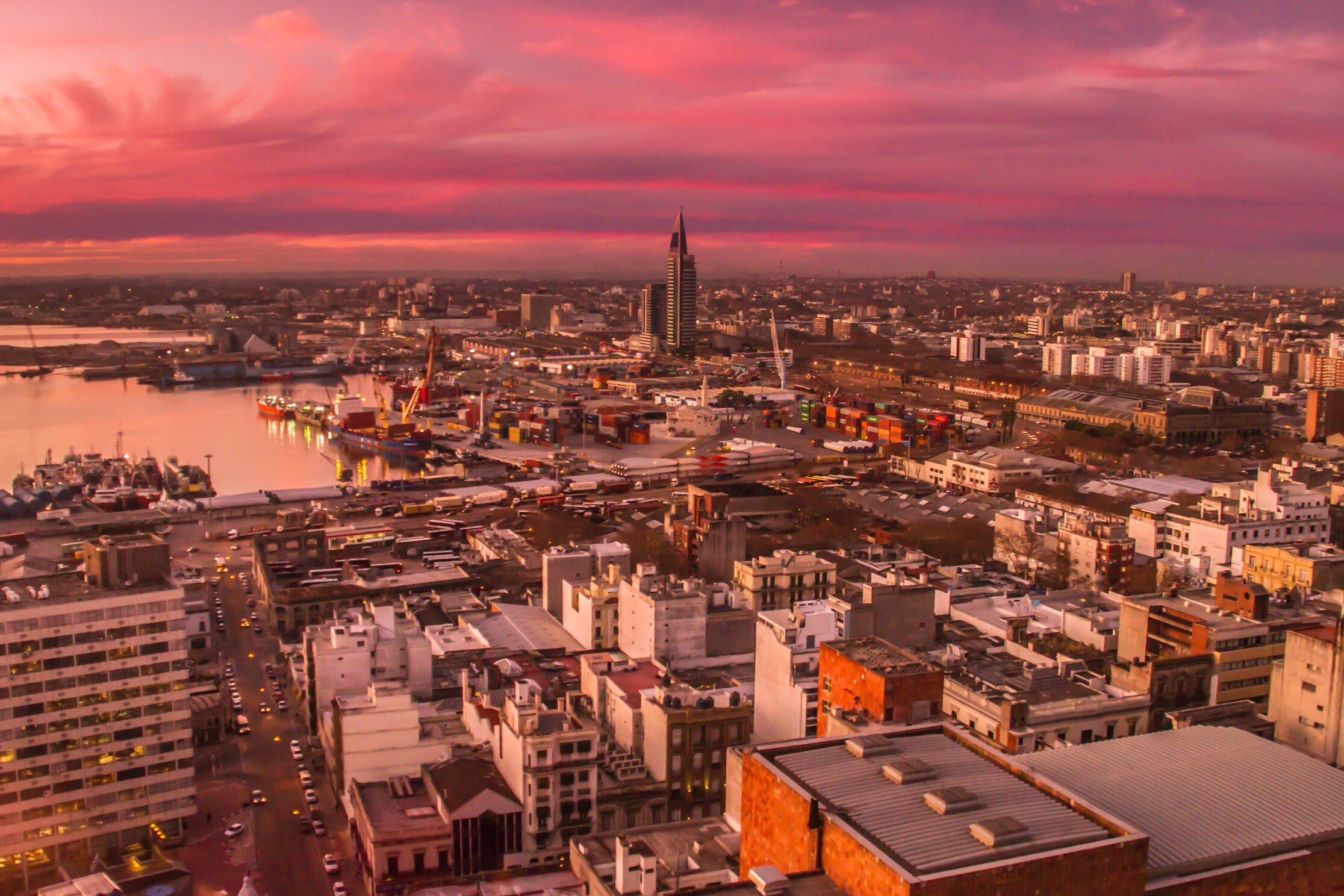Why Uruguay is a top LATAM destination for New Zealand business
Montevideo, Rambla, at night (Image: Alejo Vazquez Young)
https://www.linkedin.com/pulse/why-uruguay-top-latam-destination-new-zealand-business-heywood
Uruguay shows potential to become a strong trade partner and business destination for New Zealand entrepreneurs. The two countries share similarities in their economic history, outlook and objectives, and potential for prosperity and sustainable development.
Uruguay - named Country of the Year by the Economist in 2013 - offers competitive incentives and opportunities for New Zealand business. The small South American country also received international recognition for its response to Covid-19. Uruguay should be a top contender for Kiwi investment and business in the region. But awareness of Uruguay’s achievements and attractiveness for doing business among New Zealand entrepreneurs is uncertain.
Find out about several of Uruguay and New Zealand’s shared characteristics, and key regulatory changes that make Uruguay an attractive launchpad for Kiwi business and cooperation in Latin America.
Covid-19 success story in Latin America
Like New Zealand, Uruguay received international praise for its response to Covid-19. Statista reported the country had 2,981 cases as of 29 October 2020. Similarly-populated Panama had 131,247 reported cases. Uruguay’s border remains closed to foreign citizens, with several exceptions.
Many point to Uruguay’s comprehensive testing, quick decision-making, and exceptional public health procedures for its success. Newly-elected President Luis Lacalle Pou was sworn in on 1 March right before Uruguay’s first confirmed case in capital Montevideo on 13 March. Pou quickly shut down public events, restaurants and bars, schools and Uruguay’s border with Brazil. He did not mandate home isolation, despite Uruguay having one of the oldest populations in Latin America.
Many Latin American countries relied on medical supplies from overseas for their Covid-19 response, and were ultimately left vulnerable to fierce global competition for that equipment. Uruguay, however, developed and nationally produced their own testing kits. Gonzalo Moratorio, leader of the team in Uruguay that developed the testing kit, stated: “the US and even Europe were kind of sealing off the biotech industry... What we did was assemble various things and combine our know-how to become independent.”
Testing kits and methodologies were then decentralised from the capital and shared with hospitals, research institutes and academic groups. In a matter of weeks, 24 newly developed laboratories were testing over 233 people per confirmed Covid-19 case.
Uruguay and New Zealand: Two powerhouses punching above their weight
Uruguay and New Zealand have similar geographic, economic, and demographic landscapes, with a long history of political and social stability. They are also inextricably linked to, and impacted by, larger neighbouring economies: Australia, Argentina and Brazil.
Academics note that up until the 20th century, these two countries “were among the richest economies in the world.” Initial conditions for these two small settler economies were considered quite similar in terms of their natural wealth. Though academics debate their true comparability, existing similarities motivate many to consider Uruguay as “the New Zealand of South America.”
Uruguayan society is considered highly egalitarian, with high income per capita and relatively low levels of poverty and inequality. The country experienced positive economic growth between 2003-2018, at an average of 4.1% per year. Due to the pandemic, Uruguay’s poverty levels rose to 12% and the economy is projected to contract 4.2% in 2020. However, FocusEconomics analysts expect the economy to bounce back, expanding 3.9% in 2021.
Shared industry strengths: Agriculture
Uruguay and New Zealand both leverage their natural wealth with powerful agricultural industries. Mercopress identifies that New Zealand has a “long history of agricultural cooperation, including advocacy for freeing up global agricultural trade and promoting sustainable agricultural production” with both Uruguay and Argentina.
Uruguay dedicates around 90% of its rich agricultural terrain to breeding livestock. Meat, dairy, eggs, honey, wood, and cereals all feature among the two countries’ top exports, according to World’s Top Exports. Along with vegetable and fruit farming, Uruguay also produces rice, wheat, maize, sugar cane, soybeans and tobacco.
Notably, Uruguay was a world pioneer in fully legalizing cannabis. Former President José Mujica developed cannabis law reforms that entered into force in December 2014. Mujica, who was heralded as “the president every other country would like to have” - and who also supported the legalization of abortion and gay marriage - told BBC in 2015: "150,000 people smoke [marijuana] here and I couldn't leave them at the mercy of drug traffickers… It's easier to control something if it's legal and that's why we've done this."
Demand from North American markets where cannabis consumption is legalized, but in critically low supply, puts Uruguay in an advantageous position for trade. In August 2020, Pou simplified cannabis regulations to attract fresh investment and position Uruguay as a hub for logistics. New, streamlined regulations for cannabis production and export licenses present significant opportunities for New Zealand agribusinesses in the country.
Uruguay should be top of mind for Kiwi entrepreneurs and government-to-government partnerships seeking innovative agritech solutions. New Zealand - with world renowned innovative thinking and sophisticated agritech developments under its wing - should consider the benefits in pursuing this shared strength and interest through stronger bilateral connections in commerce, trade and technology and innovation.
Renewable energy
Uruguay has historically been a large energy customer of its neighbours, Argentina and Brazil. In 2010, the government introduced Decree 354, a regulatory framework supporting the development of and investment in local renewable energy. Over the following 10 years, the country transitioned away from oil and fuel imports from Brazil and Argentina. It now consumes around 97% of total electricity from alternative energy sources.
Uruguay’s coastline, terrain and long daylight hours give it a diverse range of potential in renewable energy, including wind (which accounts for around 50% of energy production), thermal, hydropower, and solar photovoltaic energy. It is also experimenting with biomass energy, a handy alternative during seasons of reduced hydropower energy, and as a way to reduce agricultural waste.
Now, the country is a regional leader in sustainable development and electric mobility. It is home to the first electric vehicle highway in Latin America, spanning 300 kilometres with 6 electric charging stations. Plans exist to extend the highway into Brazil and adapt an additional 48 electric charging points for electric vehicles.
Currently, New Zealand’s electricity generation sits at around 80% renewable. The country has a goal to reach 100% renewable by 2035 by focusing on wind and solar renewable sources. Cooperation and investment opportunities exist for these two like-minded countries seeking sustainable alternative energy sources. Information sharing, business partnerships and shared pursuit of innovation offer mutually beneficial development for New Zealand and Uruguay.
Benefits for New Zealand businesses in Uruguay
Besides sharing a number of economic synergies, Uruguay offers attractive conditions for New Zealand business.
Kiwi traders should look at Uruguay’s strong regional connections for trade opportunities, such as its founding membership of MERCOSUR. This powerful regional trade bloc is headquartered in Montevideo and comprises members Brazil, Argentina, Uruguay and Paraguay. It is the world’s fifth-largest economy, offering traders access to over 295 million people, and exclusive business and investment opportunities among member countries.
Uruguay also houses 11 Free Trade Zones (FTZs), designed to promote investment and business activity. These FTZs are areas within Uruguayan territory that offer various tax, duties and other commercial incentives to do business. They also permit additional freedoms in the flow of goods and assets. Lowered operational costs and tax burdens make these FTZs highly attractive for businesses to conduct trade on Uruguayan soil.
Tim Harcourt, UNSW Economist and Host of The Airport Economist, who is a regular visitor to Latin America, noted in 2013: “Uruguay may be keen to be seen as a “Pacific style” South American nation in terms of philosophy.” Reflecting on the events of 2020, he says “both Uruguay and NZ have handled Covid-19 well and have a simple regulatory framework, making them both promising countries to invest in and trade with in 2021.”
What about the lifestyle? Expatriates note some similar living conditions that may bring Kiwis some comfort and a sense of familiarity. British-born Peter Baxter lived in New Zealand for 23 years before moving to Uruguay in 2016, after having visited annually for 24 years. He observes “the cost of living is similar to New Zealand - though salaries are generally lower - internet availability is high, and in the cities, most folk have access to high-quality fibre-optic infrastructure and bandwidth. Medical care is good, education is good, and transport is fluid. Infrastructure is constantly being improved. Security isn’t quite up to what a Kiwi might expect, but it is reasonable.”
Recent regulatory changes in Uruguay
In the last 18 months, Uruguay has taken additional measures to further welcome new business and investment, including:
Decree 163/20, announced in June 2020, to simplify the requirements to gain tax residency in Uruguay
A new legal entity, the Sociedad Anónima Simplificada (SAS) or Simplified Stock Company, to promote entrepreneurship, introduced April 2019
Latin America’s first 5G deployment (April 2019) to improve telecommunications capabilities (noting it has the region’s highest broadband penetration rate).
“Now is a good time for New Zealand businesses to move to Uruguay,” says Fernanda Panizza, Founder and Partner of Uruguayan law firm Panizza & Asociados. “Our government is working to create an environment that is welcoming of entrepreneurship, innovation and sustainable development, all of which we perceive to be iconic New Zealand capabilities.”
Uruguay is also recognized by Forbes as one of the best places for residency and a second passport. Obtaining an Uruguayan passport gives entrepreneurs ease of access to larger markets from Uruguayan territory, including other MERCOSUR members.
Kiwis may find Uruguay’s economic openness and likeness, political stability, and commercial environment preferable to traditional Latin American business hotspots.
It is Uruguay’s ongoing efforts to reel in investment and skilled immigrants that now attracts many Argentines across the border. Given these countries’ shared interests and strengths, Kiwi entrepreneurs planning their Latin American venture should consider this move too.
Publicado por
Chelsea Heywood
South Pacific & Latin America | Digital Marketing & International Business
Why do people refer to #Uruguay as 'the New Zealand of South America'? 🇳🇿🇺🇾 👇Check out my first independent article on a country I'm really interested in. Some Kiwis may be surprised to discover the extent of similarities between these two countries! “Now is a good time for New Zealand businesses to move to Uruguay... Our government is working to create an environment that is welcoming of entrepreneurship, innovation and sustainable development, all of which we perceive to be iconic New Zealand capabilities." Thank you María Fernanda Panizza, Tim Harcourt, Daniela Bogota Chavez and Peter Baxter for your contributions. #newzealand #nz #business #entrepreneur #latinamerica #southamerica #latam #energysector #agriculture #agritech #agtech #agribusinesses #cannabisindustry #5gnetwork #electricvehicle #sustainability #trade #covid #wine






